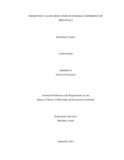
Please use this identifier to cite or link to this item:
https://hdl.handle.net/20.500.14301/352| Title: | Promoting Values Education in Schools: Experience of Principals |
| Authors: | Yonjon, Raj Kumar |
| Citation: | Yonjan,R.K.(2023).Promoting values education in schools: experience of principals |
| Issue Date: | Sep-2023 |
| Publisher: | Kathmandu University School of Education |
| School: | SOED |
| Department: | DOEL |
| Level: | M.Phil. |
| Program: | MPhil in Educational Leadership |
| Abstract: | This study explores the practice of school principals in promoting values education in their schools. The Education Act (2006, 2nd Edition) and Education Policy (2006, 3rd Edition) state school principals’ role in maintaining discipline among students and staff, ensuring students’ learning and achievement but have not mentioned promoting values education in schools. They have the role of controlling students’ behavior in school but have faced many challenges in doing so. It states more of the implementing roles of school principals than planning and decision-making. Hence, this research has aimed to answer the roles of school principals and the challenges they face while promoting values education in their schools.I have adopted narrative inquiry as my research method to explore the lived experiences and stories of school principals. Stories have powerful meanings and testimonies. School principals’ unique lived experiences were collected through in-depth interviews and coded into different categories using Saldana’s (2016) four steps of coding. The coded data were generated into different themes ensuring its alignment with Allen’s (1975) Actual Value Education and Kirschenbaum’s (1976) Value Clarification Concept. The findings are also sorted into three subheadings for readers’ convenience and named the Role of Change Maker, the Role of Empathizing, and the Role of Being a Model. School principals were found to be acting as the change-makers in their schools and beyond. It was found that principals made changes in curriculum, pedagogy, and policy, and outside the school, they have played the role of creating awareness among the parents and community people. They were found showing love, care, and compassion by accepting students even when they were difficult to love because of their behavior. As school leaders, they listened to their students and subordinates, counseled them, gave their valuable time, and prayed for them. When principals empathized with their students and subordinates, they felt morally supported, encouraged, respected, and aware of their needs and priorities. It helped them to realize that the world is not full of unjust and demeaned creatures but also with a heart of love, compassion, and respect. They were self-aware and behaved better in morality once they experienced what they had not expected. Principals were role models in their schools for both students and subordinates. They were not only teaching and training them on values education but living the values was the art of living for them. They were convinced that their students, subordinates, and community looked up to them and counted on them. They even copied them. It created a reciprocity effect. When principals treated students and subordinates with love, care, compassion, just, and respect, the same their students and subordinates returned. Similarly, their challenges are also sorted into two subheadings Tangible and Intangible challenges. It was found that curriculum, heavy textbooks, and the paper-pencil evaluation system at the school and board level were the challenges they faced as tangible challenges. They didn’t find that the curriculum has any space to foster values in students through experiential learning. The textbooks of different subjects were too bulky with subjective knowledge missing the values of education in it. The subject of moral science also is not adequately prepared. They also found that the paper-pencil evaluation system at the school and board level is also the challenge they faced in promoting values education. Parents’ and teachers’ perspectives regarding learning and growth and students’ upbringing and background were denoted as intangible challenges where they expected rote memory as learning and exam marks to an achievement. It hindered principals from practicing values education in school. It challenged their patience.This study can contribute to the school leaders if they intend to develop their schools ensuring holistic growth of their students through values education. It can also contribute to the researchers in values education, especially in Nepali Universities, helping them to find the gap in their research. Finally, it contributes to the policymakers as it states its challenges from the policy level. The study states the challenges faced by principals from the provision of policy level while implementing it in their schools. It helps policymakers to re-think or reframe the necessary provisions for promoting values education at the practice level. |
| URI: | https://hdl.handle.net/20.500.14301/352 |
| Appears in Collections: | Dissertation |
Files in This Item:
| File | Description | Size | Format | |
|---|---|---|---|---|
| WWCC_Raj Kumar Yonjon, MPhil dissertation, Final, 2023 print.pdf | 1.37 MB | Adobe PDF |  View/Open |
Items in DSpace are protected by copyright, with all rights reserved, unless otherwise indicated.